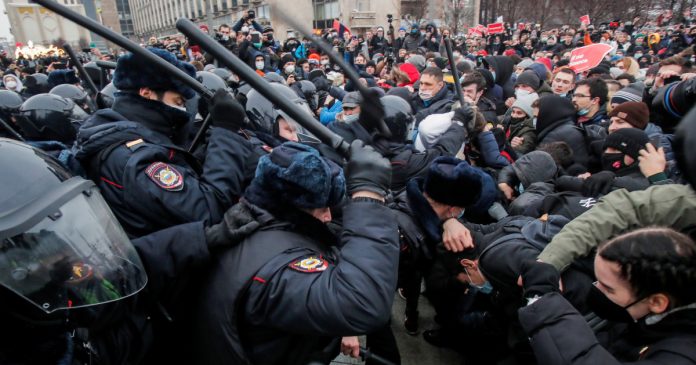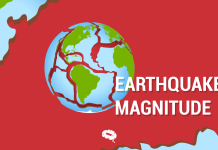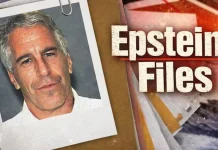[ad_1]
Supporters of jailed Kremlin critic Alexey Navalny are preparing for a fresh round of anti-government protests on Sunday, despite a police crackdown on the Russian opposition and strong warnings against participating in the demonstrations.
Navalny aides called for the new nationwide rallies to demand the opposition leader’s release from jail where he is awaiting trial, set to start on February 2.
The 44-year-old was arrested on January 17 after flying back to Russia from Germany, where he had spent five months recovering from nerve-agent poisoning. His detention sparked nationwide protests in about 100 cities last week. Nearly 4,000 people were reported arrested.
Sunday’s Moscow rally is due to take place outside the headquarters of the Federal Security Service, Russia’s main security agency, which Navalny said carried out the near-fatal poisoning attack on the orders of President Vladimir Putin. The Kremlin denies the allegation.
In an unprecedented move, police in the capital announced the closure of seven metro stations and said movement of pedestrians would be limited in the city centre.
Moscow authorities also said that some centrally located restaurants and shops will close and overground transport will be diverted.
Irina Volk, spokeswoman for the Russian interior ministry, cited the coronavirus pandemic in a Saturday warning against protests. She said participants found in violation of epidemiological regulations could face criminal charges.
“The Russian interior ministry units and other law enforcement will use all necessary measures to ensure public order at sites of mass events. Moreover, we warn that any violent actions against officers or refusal to obey their lawful orders will be prevented,” she said.
“Individuals who commit such illegal actions will be detained and held accountable according to the law.”
Navalny brother, lawyer arrested
The protests in support of Navalny last week were the largest and most widespread seen in Russia in many years, and authorities have sought to prevent a repeat. Police conducted a series of raids this week at apartments and offices of Navalny’s family, associates and anti-corruption organisation.
His brother Oleg, top aide Lyubov Sobol and three other people were put under two-month house arrest on Friday, as part of a criminal probe into alleged violations of coronavirus regulations during last weekend’s protests.
Sergei Smirnov, editor of the Mediazona news site that was founded by members of the Pussy Riot punk collective, was detained by police upon leaving his home on Saturday.
The independent online media outlet said Smirnov was held on suspicion of taking part in a protest in Moscow last weekend, while the RIA news agency said he faces a court hearing on February 3. He could face up to 30 days in jail or a fine of up to 300,000 roubles or compulsory labour.
Authorities are also targeting online platforms, demanding that they delete posts with calls for rallies or face fines. The country’s media watchdog said on Friday that it summoned representatives of several social networks, including Facebook and TikTok, for failing to comply.
In a message from jail on Thursday, Navalny urged Russians to stage new rallies.
“The majority is on our side. Let’s wake them up,” he wrote from Moscow’s Matrosskaya Tishina, a high-security detention centre.
Navalny was remanded in custody on the grounds that his months recovering in Germany violated terms of a suspended sentence he received in a 2014 conviction for fraud and money laundering, a case that he has said was political revenge.
Russian authorities have also launched probes against Navalny’s associates both in Russia and abroad.
The Investigative Committee said on Friday that Leonid Volkov, head of Navalny’s regional network and who is based in Lithuania, was wanted on charges of calling minors to join unauthorised rallies.
On Saturday, investigators launched a fraud probe into Ukraine-based businessman Alexander Khomenko who they say funded Navalny’s Anti-Corruption Foundation that publishes investigations into the wealth of Russia’s political elites.
Black Sea palace
Its most recent video report alleging Putin was gifted a $1.35bn property on the Black Sea coast garnered more than 100 million views on YouTube becoming Navalny’s most-watched investigation.
The Kremlin has denied that the Russian president owns the opulent complex, which according to Navalny features an underground ice hockey arena, a private casino and vineyards.
State television on Friday sought to rebut opposition claims the Black Sea property was a luxurious palace by airing footage of it under construction.
Billionaire Arkady Rotenberg – Putin’s former judo partner – said on Saturday that he was the owner of the property and that he was building a hotel there.
“Now, it will no longer be a secret, I am the beneficiary,” Rotenberg said in a video published by the Mash Telegram channel. “There was a rather complicated facility, there were a lot of creditors, and I managed to become the beneficiary.”
He gave no further financial details of the purchase or how it had been funded.
Rotenberg was among the Russian officials and business executives blacklisted by the United States and other Western powers in the aftermath of Russia’s annexation of Crimea in March 2014.
[ad_2]
Source link











